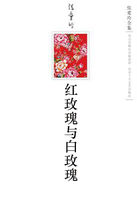By this time the canal was gilded with sunlight. The pure morning air was very delightful, and skaters were gradually increasing in numbers. It was hard to obey the summons. But Gretel and Hans were good children; without a thought of yielding to the temptation to linger, they pulled off their skates, leaving half the knots still tied. Hans, with his great square shoulders and bushy yellow hair, towered high above his blue-eyed little sister as they trudged homeward. He was fifteen years old and Gretel was only twelve. He was a solid, hearty-looking boy, with honest eyes and a brow that seemed to bear a sign GOODNESSWITHIN just as the little Dutch zomerhuis *{Summer house} wears a motto over its portal. Gretel was lithe and quick; her eyes had a dancing light in them, and while you looked at her cheek the color paled and deepened just as it does upon a bed of pink and white blossoms when the wind is blowing.
As soon as the children turned from the canal, they could see their parents' cottage. Their mother's tall form, arrayed in jacket and petticoat and close-fitting cap, stood, like a picture, in the crooked frame of the doorway. Had the cottage been a mile away, it would still have seemed near. In that flat country every object stands out plainly in the distance; the chickens show as distinctly as the windmills. Indeed, were it not for the dikes and the high banks of the canals, one could stand almost anywhere in middle Holland without seeing a mound or a ridge between the eye and the "jumping-off place."None had better cause to know the nature of these same dikes than Dame Brinker and the panting youngsters now running at her call.
But before stating WHY, let me ask you to take a rocking-chair trip with me to that far country where you may see, perhaps for the first time, some curious things that Hans and Gretel saw every day.
HollandHolland is one of the queerest countries under the sun. It should be called Odd-land or Contrary-land, for in nearly everything it is different from the other parts of the world. In the first place, a large portion of the country is lower than the level of the sea. Great dikes, or bulwarks, have been erected at a heavy cost of money and labor to keep the ocean where it belongs. On certain parts of the coast it sometimes leans with all its weight against the land, and it is as much as the poor country can do to stand the pressure. Sometimes the dikes give way or spring a leak, and the most disastrous results ensue.
They are high and wide, and the tops of some of them are covered with buildings and trees. They have even fine public roads on them, from which horses may look down upon wayside cottages.
Often the keels of floating ships are higher than the roofs of the dwellings. The stork clattering to her young on the house peak may feel that her nest is lifted far out of danger, but the croaking frog in neighboring bulrushes is nearer the stars than she. Water bugs dart backward and forward above the heads of the chimney swallows, and willow trees seem drooping with shame, because they cannot reach as high as the reeds nearby.
Ditches, canals, ponds, rivers, and lakes are everywhere to be seen. High, but not dry, they shine in the sunlight, catching nearly all the bustle and the business, quite scorning the tame fields stretching damply beside them. One is tempted to ask, "Which is Holland--the shores or the water?" The very verdure that should be confined to the land has made a mistake and settled upon the fish ponds. In fact, the entire country is a kind of saturated sponge or, as the English poet, Butler, called it, A land that rides at anchor, and is moor'd, In which they do not live, but go aboard.
Persons are born, live, and die, and even have their gardens on canal-boats. Farmhouses, with roofs like great slouched hats pulled over their eyes, stand on wooden legs with a tucked-up sort of air, as if to say, "We intend to keep dry if we can."Even the horses wear a wide stool on each hoof as if to lift them out of the mire. In short, the landscape everywhere suggests a paradise for ducks. It is a glorious country in summer for barefoot girls and boys. Such wading! Such mimic ship sailing!
Such rowing, fishing, and swimming! Only think of a chain of puddles where one can launch chip boats all day long and never make a return trip! But enough. A full recital would set all young America rushing in a body toward the Zuider Zee.
Dutch cities seem at first sight to be a bewildering jungle of houses, bridges, churches, and ships, sprouting into masts, steeples, and trees. In some cities vessels are hitched like horses to their owners' doorposts and receive their freight from the upper windows. Mothers scream to Lodewyk and Kassy not to swing on the garden gate for fear they may be drowned! Water roads are more frequent there than common roads and railways;water fences in the form of lazy green ditches enclose pleasure-ground, farm, and garden.














